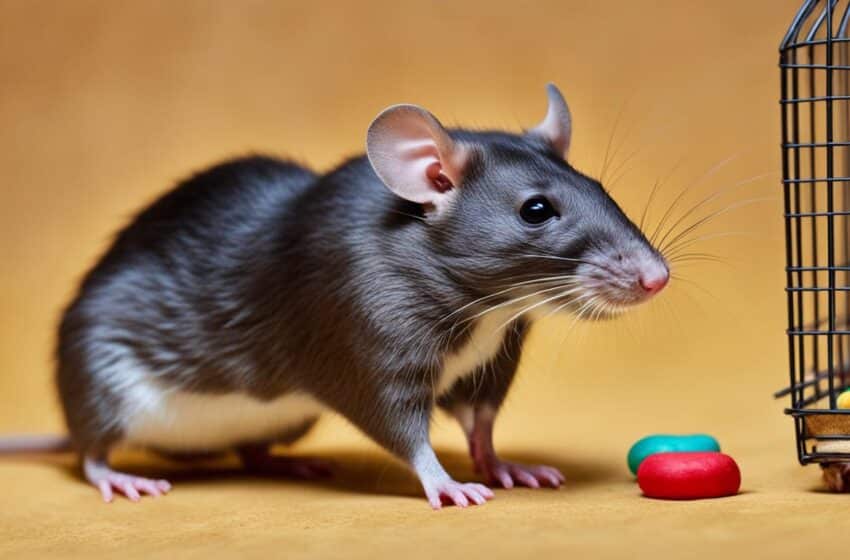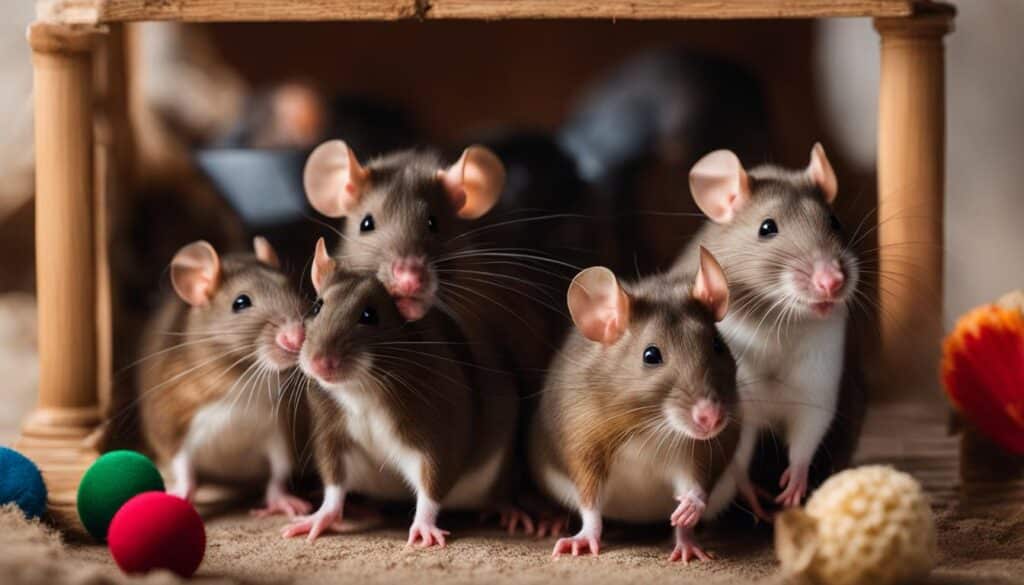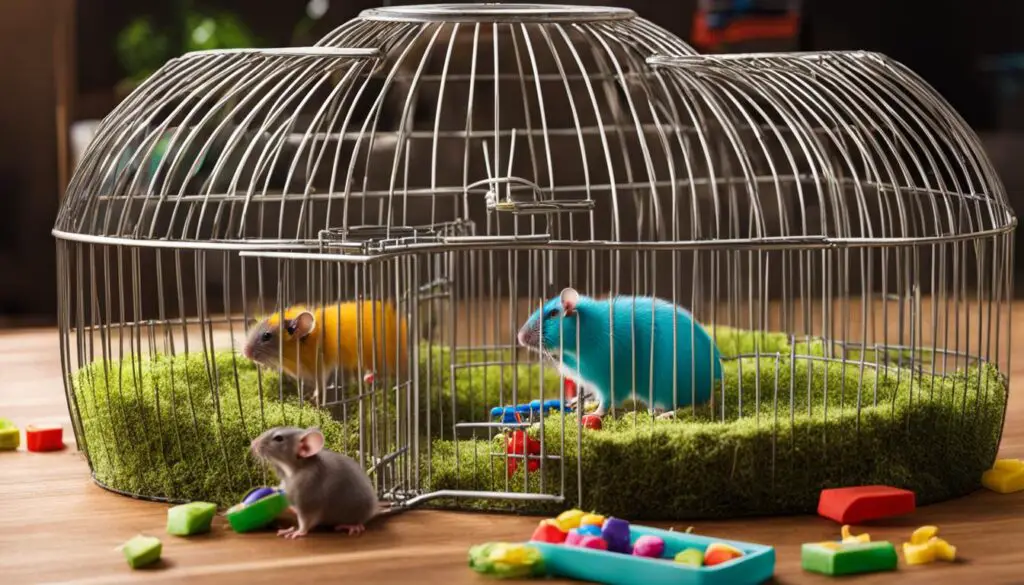Handling Aggression in Pet Rats: Tips and Solutions

Greetings, fellow pet rat enthusiasts! Today, I want to address a common issue that many rat owners face: dealing with aggression in pet rats. As loving caretakers, it is essential for us to understand and manage aggression in order to maintain a harmonious bond with our furry friends.
Aggression in pet rats can occur in both males and females, and it can be triggered by various factors such as dominance, fear, territorial behavior, or hormonal changes. It is important to observe our pet rats’ behavior and body language to identify the underlying causes of their aggression.
In this article, I will share tips and solutions for managing aggression in pet rats, ensuring a safe and enjoyable environment for both you and your little companions.
Key Takeaways:
- Aggression in pet rats is a common behavior issue that can be seen in both males and females.
- Understanding the underlying causes of aggression is crucial in implementing appropriate strategies.
- Socialization, supervised interactions, and positive reinforcement training are effective ways to manage aggression.
- Neutering, environmental enrichment, and seeking professional help are viable solutions for aggressive pet rats.
- With patience, understanding, and consistent training, aggression in pet rats can be minimized, leading to a harmonious relationship.
Understanding Aggression in Pet Rats
Aggression in pet rats can be caused by various factors, including dominance, fear, territorial behavior, or hormonal changes. It is important to recognize the signs of aggression to address the issue effectively and ensure the well-being of your furry friend.
Causes of Aggression
- Dominance: Rats have a hierarchical social structure, and aggression can occur when establishing dominance within a group.
- Fear: Rats may exhibit aggression when they feel threatened or fearful of their environment or unfamiliar situations.
- Territorial Behavior: Rats can become aggressive when defending their territory, especially if they feel their space is being invaded.
- Hormonal Changes: Hormonal fluctuations, particularly in intact males, can contribute to aggressive behavior, especially during breeding seasons.
Understanding the underlying motives behind aggression is crucial in developing effective strategies to manage it.
Signs of Aggression
Signs of aggression in pet rats may include:
- Biting: Aggressive rats may bite as a form of defense or to establish dominance.
- Hissing: Rats may hiss when feeling threatened or displaying defensive behavior.
- Chasing: Aggressive rats may chase or pursue other rats or humans as an aggressive display.
- Aggressive Vocalizations: Rats can emit various sounds, such as growls or squeals, when exhibiting aggressive behavior.
By observing your pet rat’s body language and behavior, you can recognize the signs of aggression and take appropriate action.
Implementing Strategies
“To effectively manage aggression in pet rats, it is essential to implement appropriate strategies based on the underlying causes.”
When dealing with aggression, it is important to provide a safe and enriching environment for your pet rats. This includes:
- Proper socialization: Regular and supervised interactions with humans and other rats can help rats become accustomed to different situations, reducing fear-based aggression.
- Positive reinforcement training: Reward-based training can help modify aggressive behavior and reinforce positive interactions.
- Environmental enrichment: Providing a variety of toys, hiding spots, and opportunities for exercise can alleviate boredom and frustration, which may contribute to aggression.
It is crucial to be patient and consistent in your approach to effectively manage aggression in pet rats. Seek professional help if the aggression persists or escalates despite your efforts.
Note:
Please note that addressing aggression in pet rats should be done with care and under the guidance of a knowledgeable veterinarian or animal behaviorist.
Summary of Aggression in Pet Rats
| Causes | Signs | Strategies |
|---|---|---|
| Dominance | Biting | Proper socialization |
| Fear | Hissing | Positive reinforcement training |
| Territorial Behavior | Chasing | Environmental enrichment |
| Hormonal Changes | Aggressive vocalizations | Seek professional help if necessary |
Tips for Managing Aggression in Pet Rats
When dealing with aggression in pet rats, socialization is key. Provide plenty of opportunities for supervised interactions with humans and other rats to ensure they are well-adjusted. Socialization plays a vital role in shaping their behavior and preventing aggressive tendencies.

Positive reinforcement training is another effective method for managing aggression in pet rats. By rewarding desired behaviors, you can encourage positive actions and discourage aggressive behavior. Use treats, praises, and rewards to reinforce good behavior and create a positive association with social interactions.
Regular handling and supervised playtime can also help in managing aggression. By engaging in interactive play sessions with your pet rat, you can redirect their energy and provide mental stimulation. This helps to prevent boredom and frustration, which are common triggers for aggressive behavior.
Remember to approach socialization and training sessions with patience and consistency. Every pet rat is unique, and it may take time for them to adjust and develop better behaviors. But with continuous training and positive reinforcement, you can build a peaceful and loving relationship with your pet rat.
Benefits of Socialization and Positive Reinforcement Training:
- Promotes a sense of belonging and acceptance within the rat community
- Reduces fear and anxiety, leading to a calmer and happier rat
- Enhances communication skills and promotes healthy interactions
- Builds trust and strengthens the bond between you and your pet rat
- Instills a sense of confidence in your pet rat, reducing the need for aggression
“Socialization and positive reinforcement training play a crucial role in managing aggression in pet rats. By providing opportunities for supervised interactions and using rewards to reinforce positive behaviors, you can promote a harmonious and loving relationship with your furry companion.”
Socialization Techniques for Pet Rats
| Technique | Description |
|---|---|
| Introduce rats to each other gradually | Allow rats to sniff and explore each other’s scent before direct introductions |
| Supervised playdates | Organize controlled interactions with other pet rats in a neutral area |
| Handling and grooming | Regularly handle and groom your pet rat to increase their comfort with human touch |
| Positive reinforcement training | Use rewards and treats to encourage desired behaviors and discourage aggression |
Solutions for Aggressive Pet Rats
In some cases, aggression in pet rats may be influenced by hormonal changes. Neutering can help to decrease aggressive behaviors associated with mating instincts. Environmental enrichment is also essential to prevent boredom and frustration, which can contribute to aggression. Providing a variety of toys, hiding spots, and exercise opportunities will keep your pet rat mentally stimulated and reduce aggression.
If the aggression persists or escalates, seeking professional help from a veterinarian or animal behaviorist is recommended. These professionals have the expertise and experience to evaluate your pet rat’s behavior and provide tailored solutions to address the aggression effectively.

Environmental enrichment plays a crucial role in managing aggression in pet rats. It ensures that they have a stimulating and engaging environment that promotes their natural behaviors. By providing a variety of toys, hiding spots, and exercise opportunities, you can keep your pet rat mentally stimulated and reduce aggression. Experiment with different types of toys, such as puzzle feeders and tunnels, to keep your pet rat entertained.
“Environmental enrichment provides a positive outlet for a rat’s natural instincts and behaviors, reducing the likelihood of aggression.” – Dr. Emily Thompson, Animal Behaviorist
Neutering is another effective solution for dealing with aggression in pet rats. It can help to decrease aggressive behaviors associated with mating instincts. By neutering your pet rat, you can reduce their hormonal drive and minimize territorial and dominance-related aggression. Consult with a veterinarian to determine the best time to neuter your pet rat and discuss any potential risks or considerations.
Seeking Professional Help
If your pet rat’s aggression continues to persist or escalate despite your efforts, it is important to seek professional help from a veterinarian or animal behaviorist. These professionals have the knowledge and experience to evaluate your pet rat’s behavior, diagnose any underlying issues, and provide specialized guidance and treatment options.
- Start by consulting with your regular veterinarian who can assess your pet rat’s overall health and behavior.
- If necessary, your veterinarian may refer you to a certified animal behaviorist who specializes in rodent behavior.
- The animal behaviorist will conduct a thorough evaluation of your pet rat’s behavior and develop a personalized behavior modification plan.
- They may recommend techniques such as desensitization, counter-conditioning, or positive reinforcement training to address the aggression.
Remember that every pet rat is unique, and what works for one may not work for another. It is essential to be patient, consistent, and understanding throughout the process. With the combination of neutering, environmental enrichment, and professional help, you can effectively manage and resolve aggression in your pet rat, ensuring a happy and harmonious relationship.
Conclusion
Dealing with aggression in pet rats requires patience, understanding, and consistent training. By understanding the causes of aggression and implementing appropriate strategies, you can effectively manage and minimize aggressive behaviors in your pet rat.
It is crucial to prioritize socialization, positive reinforcement, and environmental enrichment to promote a harmonious relationship with your furry friend. Regular interactions with humans and other rats, under supervision, will help your pet rat develop the necessary social skills and adjust to different environments.
Furthermore, positive reinforcement training techniques, such as rewarding desired behaviors and discouraging aggression, will help shape your pet rat’s behavior in a positive way. Remember, consistency is key when training your pet rat.
In addition to socialization and training, providing environmental enrichment is essential in preventing boredom and frustration, which can contribute to aggression. Offering a variety of toys, hiding spots, and opportunities for exercise will keep your pet rat mentally stimulated and reduce aggressive tendencies.
By following these guidelines and dedicating time and effort, you can help your pet rat overcome aggression and enjoy a peaceful and loving bond. Remember, every pet rat is unique, and it may take time to see the desired results. Trust the process and enjoy the journey of building a harmonious relationship with your pet rat.
FAQ
What are the causes of aggression in pet rats?
Aggression in pet rats can be triggered by factors such as dominance, fear, territorial behavior, or hormonal changes.
What are the signs of aggression in pet rats?
Signs of aggression may include biting, hissing, chasing, or aggressive vocalizations.
How can I manage aggression in my pet rat?
Socialization is key. Provide plenty of opportunities for supervised interactions with humans and other rats. Positive reinforcement training can also help to shape desired behaviors and reduce aggression.
Can hormonal changes contribute to aggression in pet rats?
Yes, hormonal changes can influence aggression in pet rats. Neutering can help to decrease aggressive behaviors associated with mating instincts.
How can I prevent aggression in my pet rat?
Environmental enrichment is essential. Provide a variety of toys, hiding spots, and exercise opportunities to keep your pet rat mentally stimulated and reduce aggression.
What should I do if the aggression persists or escalates?
If the aggression persists or escalates, seeking professional help from a veterinarian or animal behaviorist is recommended.



